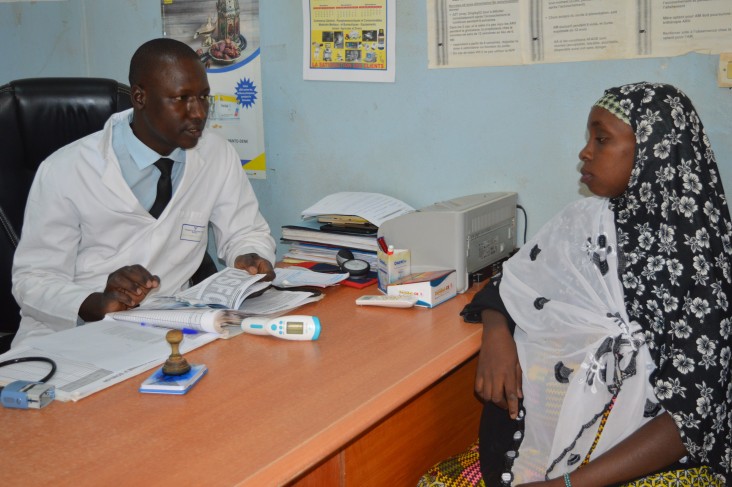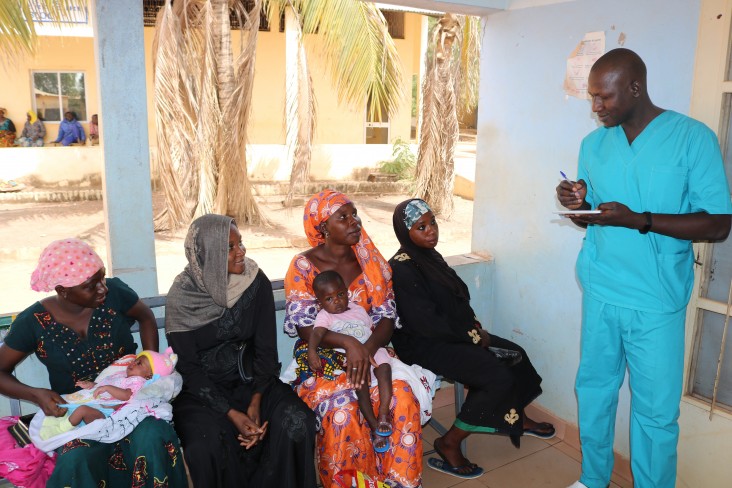Speeches Shim

In 2017, Dr. Namory Camara’s career took a new trajectory when, after seven years of working in private health clinics, he joined Mali’s civil service and was assigned to the Kadiolo Referral Health Center in the Sikasso region. At 37, he was appointed the reproductive health officer in this public facility, responsible for maternity services and working with midwives who had substantially more experience than he did.
A new responsibility, a fast learner
“It is a heavy responsibility, but I do my best,” says Dr. Camara. “The position corresponds perfectly to my deepest aspirations, which are the well-being of women and children.”
Physicians like Dr. Camara are needed in Mali. Maternal and infant mortality are high, with 325 maternal deaths per 100,000 live births and 54 of every 1,000 children dying before their first birthday. USAID is working with Mali’s health system leadership to improve maternal, newborn, and child health services at referral health centers such as Kadiolo. Dr. Camara participated in one of the trainings in 2018 shortly after arriving at the facility. He is one of 400 health care providers from five regions to sign up for classes.
“This training gave me the opportunity to speak the same language as my midwifery colleagues with regard to standards for care, because as head of maternity services, I was completely out of date in this area,” said Dr. Camara.
In a pre-test during the initial phase of training, one of the midwives beat his test score, igniting a spirit of competition. After that, he dedicated himself to mastering the material.
High impact initiatives
Each morning before staff meeting, Dr. Camara meets with the on-call team and visits the women who have recently given birth as well as those in labor. He reviews patient records, especially of women admitted in the past 24-hours, to identify and reduce any disparities in patient care. “I focus on teamwork, the use of data for decision-making, and the needs of patients. These working principles have become our norm,” says Dr. Camara.
Early on, he discovered gaps in certain documents, including a checklist of essential practices designed to prevent maternal and infant deaths during childbirth.
“I made the heads of the care teams responsible for monitoring the accurate completion of all of the maternity data collection documents, including the checklist,” he noted. “I also set up a rotation system to facilitate familiarity of systems across the family planning, prenatal, postnatal, and prevention of mother-to-child transmission of HIV units. These changes have contributed considerably to improving the quality of data, continuity and availability of services.”
According to Dr. Camara, advances in data collection and monitoring, especially through proper use of the safe birth checklist, have improved the quality of care for newborns and their mothers during the 24 hours after delivery. Complications were detected early and adequately managed, and the care rating for newborns and mothers improved from 15 to approximately 89 out of 100 at the targeted facilities.

A face of caring and conviction
Dr. Camara’s colleagues are impressed by his approach. Midwife Fatoumata Coulibaly says that in her 15 years of service, she has never seen a young doctor engaged in his work like Dr. Camara. Midwife Manager Ramata Fofana agrees, emphasizing, “he loves his work and he manages the staff well.”
Dr. Camara’s commitment as a quality improvement coach for maternity service providers at 24 community health centers affiliated with the Kadiolo health center ensures that the network is providing services in accordance with Mali’s standards.
USAID’s Human Resources for Health 2030 (HRH2030) program works in five target regions of Mali — Kayes, Koulikoro, Sikasso, Mopti, and Ségou — to reduce maternal, neonatal, and infant mortality. By institutionalizing interventions, including coaching and mentoring, HRH2030 aims to improve access to, demand for, and quality of health services in a sustainable and meaningful way.
Read the full story here

Comment
Make a general inquiry or suggest an improvement.